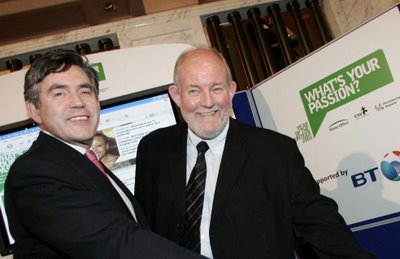 As much as some will deny it, a lot of us get our kicks from watching the suffering of other people. Call it schadenfreude when it involves our enemies, call it rubbernecking when we go past a road accident, call them gorehounds when they enjoy horror films or searching for the real equivalent online, call it what you will, most of us either enjoy or at the least, are fascinated and intrigued by it. Most of us however don't get the urge to join in with the activities, or want to be in the car accident.
As much as some will deny it, a lot of us get our kicks from watching the suffering of other people. Call it schadenfreude when it involves our enemies, call it rubbernecking when we go past a road accident, call them gorehounds when they enjoy horror films or searching for the real equivalent online, call it what you will, most of us either enjoy or at the least, are fascinated and intrigued by it. Most of us however don't get the urge to join in with the activities, or want to be in the car accident.
Charles Clarke seems to be one of the individuals who lives in this vicarious fashion. He's never seen a battle involving the Labour party and also Gordon Brown that he hasn't wanted to join in on. Early last year he along with Alan Milburn launched the incredibly short lived 20:20 vision site, which many saw straight away as being an attempt to flush out a "modernising" candidate to challenge Gordon Brown's unopposed ascension to the top job. A little over a month later he was again angered to speak out because Brown and the deputy leadership candidates were daring to undermine the Dear Leader at a "time of international crisis". His last missive was back in the dog days of December, when he (quite rightly) criticised Brown's "British jobs for British workers" line but then went off on tangents about Brown not supporting his ministers enough and his appointment of Mark Malloch Brown as a foreign minister. This isn't to mention Clarke's most notorious blast against Brown, whom he accused of having "psychological issues", of being uncollegiate, deluded and a control freak, after the supposed 2006 September coup attempt against Blair.
It was then perhaps only a matter of time before Clarke spoke out again, and his timing it has to be said is meticulous, coming after the poor response to yesterday's housing measures and before the expected announcements on fuel. The only surprise is that he has in effect kept his powder dry with an article in the New Statesman, which for the most part covers Clarke's other pet peeve, the on-going labelling of the various factions as Blairite and Brownite.
Matters aren't helped by the fact that it's a highly confused and hardly illuminating piece to say the least. The vast majority of it is given over to defending Blairism and Blair's legacy as he sees it, whilst at say time attempting to argue that the labels no longer mean anything now that Blair has exited the scene. This would be more convincing if Clarke himself was offering absolutely anything beyond a slightly more left-wing version of Blairism, but he isn't. He says that "[E]veryone in Labour needs to stop obsessing about the past and to start obsessing about the future," then spends the next 500 words doing exactly that by going over again the well-worn path of Blair's political journey. He opens the article with by saying that the term Blairite is being used, misleadingly, to "characterise the policies and personalities of some who question the party's current direction and urge Labour to face the future," but how else should they be described when the likes of David Miliband, an undoubted Blair protege, and those backing him at least in the shadows are undoubtedly former Blair loyalists? It's not even as though all those challenging Brown over policy are being tarred with the same brush: the likes of Compass aren't being called Blairite, because they're not. Clarke complains that "Blairite" was how Brown's team apparently responded to Miliband's article in the Guardian, but probably a better and more accurate response would have been to call it crap, which is what it was.
It's not worth the full bother of picking through Clarke's version of what Blairism was, but there are a couple of examples of absolutely barking nonsense and other things that need to corrected:
Liberal interventionism must be underpinned by military force, but its moral authority was undermined by the glacial progress in preventing proliferation of weapons of mass destruction and the ill-considered determination to renew Trident.
This is an incredibly selective account of what undermined liberal interventionism. Surely what actually undermined it was the fact that there was never any moral authority to begin with over Iraq because the US and UK could not get UN approval for the war. This authority was then reduced further due to the abysmal decision-making once the war was won. Then there's the little thing of the ever spiralling numbers of dead; those that thought liberal interventionism was meant to save lives must be rather surprised that the war and resulting insurgency have left at the very least 150,000 dead. It also doesn't help when you base your case for war on weapons which subsequently turn out to have been destroyed years before, confirming that Saddam for the most part had been complying with the UN resolutions which even now the few remaining supporters of the war cling to as their defence for action.
The rise of terrorist atrocities, including London in 2005, identified Tony Blair with tough efforts to strengthen security, sometimes at a perceived cost to liberty.
Sometimes at a perceived cost? You have to admire the nerve of Charles Clarke in writing this sentence, considering he was the one that helmed the push for 90 days detention without charge for "terrorist suspects". Blair pushed through the illiberal and ineffective control orders, set-up a British version of Guantanamo in Belmarsh until the House of Lords ruled against indefinite detention without trial for foreign citizens, established the new laws on glorifying terrorism, introduced section 44 of the Terrorism Act of 2000, banned demonstrations within a mile of Parliament without permission from the police and fought to introduce ID cards, to list but some of the deprivations of liberty which happened under his watch. The one that can be said somewhat in his defence is that Gordon Brown picked up his chalice and ran with it by reintroducing 42 days, only to be humiliated by having to depend on the support of the DUP to get it through the Commons, with the Lords certain to reject it.
Economic "Blairism" was also defined by opposition to increasing taxes. This reflected the Reagan/Thatcher economic consensus, reinforced by Labour's 1992 shadow Budget, that tax-raising political parties lost elections. This belief underpinned the disastrous and unfair basic-rate cut, financed by abolition of the 10p rate, of Gordon Brown's 2007 Budget.
This is just wrong. The start of the second term was defined by the raising of national insurance to pay for the increased funding of the NHS. The campaign for re-election in 2001 was essentially based around the fact that taxes would most likely be raised to do so; to pretend otherwise is just as myopic and deluded as the statement in the 20:20 vision manifesto which claimed that both Britain and the world had become better and fairer after 10 years of Tony Blair.
The only conclusion that can be reached is that Clarke wrote this pap just so he could get to the final three paragraphs and his wider point:
This past week, Alistair Darling rightly said that the "coming 12 months will be the most difficult 12 months the Labour Party has had in a generation". Blairism as a concept offers little by way of rescue. It is certainly not a guide to action. Equally, however, it is inaccurate and misleading to dismiss as some kind of Blairite rump those who fear that Labour's current course will lead to utter destruction at the next general election.
There is no coherent Blairite ideology. Many of us who were proud to be members of Tony Blair's government had differing approaches even then, and certainly propose differing prescriptions now.
It is of course perfectly true that there is no coherent Blairite ideology. How could there be when so much of Blairism was focused on responding to whatever the current issue on the front pages of the tabloids was. Blairite ideology took Thatcherite economics and combined it with the populism of increasing funding to the public services, leading to endless debilitating reform which has dogged both the NHS and the education sector for the past 10 years. Socially Blairism involved being even more socially authoritarian and intolerant than the very worst excesses under Michael Howard, in effect handing over criminal justice policy to the Sun, without ever learning the lesson that you cannot possibly be populist enough on law and order to satisfy them. Brown has somewhat learned this lesson, but even he has been criminally stupid enough to hand over policy on cannabis to Paul Dacre.
Clarke is equally right when he says that Blairism is no answer and that it's inaccurate to suggest that just the Blairites think Labour is on the path to disaster. How could it just be the Blairites when the entire Labour party knows full well that it's doomed, including Alastair Darling and Brown himself? Where he comes unstuck is in that Clarke hasn't offered a single suggestion for what Labour ought to do to get itself of this mess. He's spent the entire piece examining Blairism then comically denies that it has anything to offer or that it's Blairites behind the plotting. It's in the conclusion that he finally gives the game away:
Similarly, there is no Blairite plot, despite rumours and persistent newspaper reports. There is, however, a deep and widely shared concern - which does not derive from ideology - that Labour is destined to disaster if we go on as we are, combined with a determination that we will not permit that to happen.
And just who is it that will not permit that to happen? Why, it couldn't be Clarke himself and that non-existent Blairite plot, could it? Let's be clear here - while it may not be the Blairites themselves that will wield the dagger, it will be they who have the most to gain from it. The rest of the party is already defeated, resigned to losing and being out of power for the years to come. It was Blair that brought the party to where it is today, not Brown, who was too cowardly to force him out sooner, and still they aren't satisfied with the corpse of the party which is left. That want that to be stamped out too. The triangulation of Blairism has led directly to the complete lack of significant difference between all main three political parties, squabbling over an ever decreasing part of the centre-right spectrum, and still the agenda supported by the Blairites and the post-Blairites, if that's what Clarke wants them to instead be referred to is unimpeachable. They've become the new establishment, convinced that they have a divine right to keep governing even while the natural party of government steals their clothes. Winning elections is not the key; serving the people is. All today's politicians have lost sight of that, none more so than Charles Clarke.Labels: Blairites, Charles Clarke, death of Labour, Gordon Brown, New Statesman, politics





